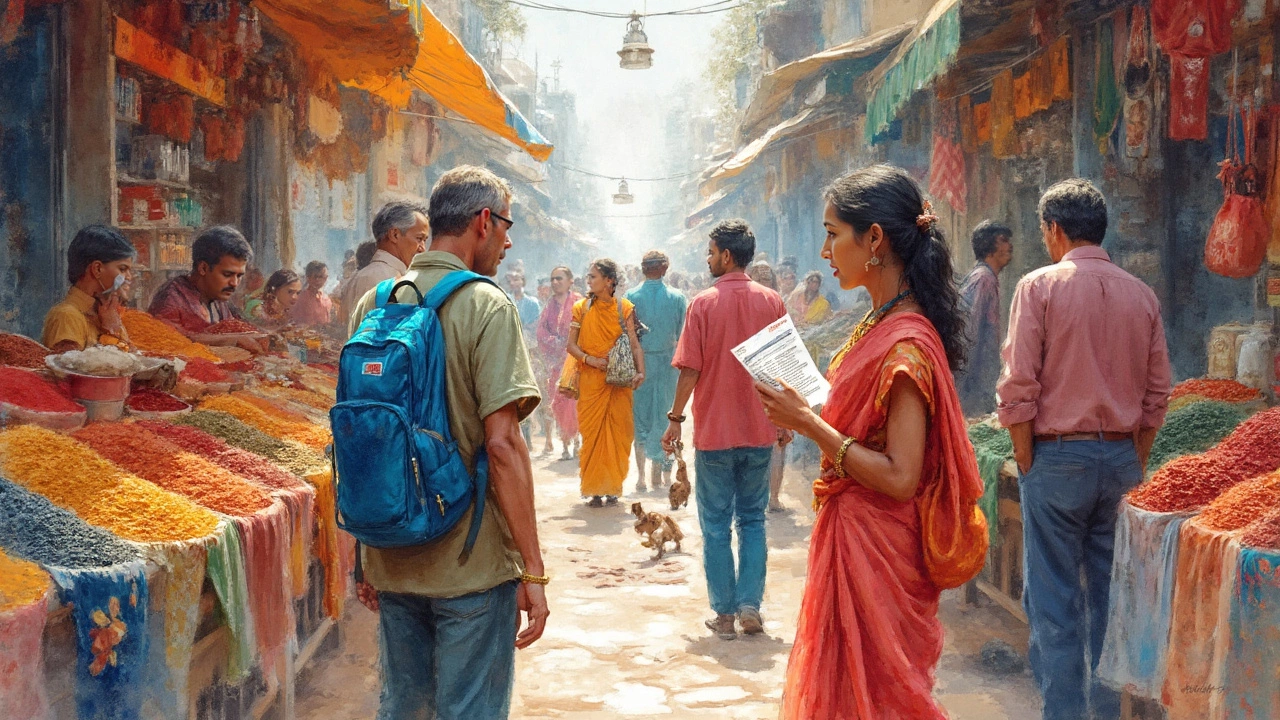Do You Really Need Vaccinations for Traveling to India?

- Feb, 15 2025
- 0 Comments
- Aaron Blackwood
Thinking about a trip to India but unsure if you need vaccinations? You're not alone. Travelers often wonder about the necessity of these shots, especially when trying to keep expenses down. Vaccinations might feel like a hassle, but they're crucial for a healthy journey, and let's face it—nobody wants to cut their trip short because of an avoidable illness.
So, what's the deal with vaccinations for India? Certain diseases like Hepatitis A, Typhoid, and Malaria are more prevalent there, and some shots are just plain smart to get. This article won’t just tell you what vaccinations you might need but will also give you practical tips to manage them without blowing your budget.
Don't worry, getting vaccinated doesn't have to be expensive or complicated. We'll dive into how you can handle it effectively while preparing for an unforgettable trip to India. Stay tuned and stay safe!
- Why Vaccinations Matter
- Must-Have Vaccinations
- Budget-Friendly Health Tips
- Staying Safe While Traveling
Why Vaccinations Matter
Let's get real—when you're planning a trip, the thought of getting vaccinated might not be thrilling. But, for a destination like India, it's crucial. You're not just protecting yourself; you're making sure that your adventure doesn't take an unexpected, unhealthy turn.
Your Safety Net
India is vibrant and full of life, but some diseases are more prevalent there than what you might be used to. For example, Typhoid and Hepatitis A are common due to different sanitation standards and water quality. Vaccinations act like a safety net, shielding you from these risks.
Travel Insurance's Best Friend
Picture this: you've planned your dream budget travel, but an illness strikes, and suddenly you're looking at unplanned medical expenses. Getting your necessary vaccinations beforehand is like having an extension of a good travel insurance policy; it helps avoid unexpected costs from falling sick.
Investing in Health Pays Off
Worried about the extra cost? Think of vaccinations as an investment. Spending a little now can save you heaps later. Plus, boosted immunity means a smoother, stress-free trip.
Stats That Speak
| Disease | Risk Level | Vaccine Availability |
|---|---|---|
| Hepatitis A | High | Available |
| Typhoid | Moderate | Available |
| Malaria | Varies by Region | Prophylaxis |
Keep these details handy as you make plans to jet off to India. You'll enjoy those bustling markets, serene temples, and chaotic streets much more with peace of mind. With the right precautions, your trip can be enjoyable and safe, ensuring your focus remains on the experience rather than health concerns.
Must-Have Vaccinations
Heading to India? You might want to roll up your sleeves for some vaccinations. It’s not just about ticking boxes; it’s about staying healthy and enjoying your trip without any unwelcome surprises.
Hepatitis A
This one tops the list for a reason. Hepatitis A spreads through contaminated food and water, and with India's love for street food, it’s something you don’t want to skip. A shot can protect you for about a year, and a booster can stretch that to a couple of decades.
Typhoid
Similar to Hep A, Typhoid is another risk due to water and food. The shot is recommended if you're planning to go rural or stay longer than a couple of weeks. It’s a simple jab, but it could save you a load of trouble.
Malaria
Malaria isn’t something you can vaccinate against, but taking anti-malarial pills before and during your trip can keep you safe. Mosquitoes are the culprit here, so don't forget your insect repellent and mosquito net, especially if you’re exploring the countryside.
Other Considerations
Depending on your activities, things like Rabies and Japanese Encephalitis might come into play. Planning on doing some hiking? Rabies shots are worth considering. Should you visit during monsoon or hit regions like Assam, a jab for Japanese Encephalitis might be a smart move.
Traveling is all about exploring new places, meeting new people, and enjoying new experiences, but health should still be a priority. Chat with a health professional about your plans, and make sure you’re all set before you zip up your suitcase.
| Vaccination | Purpose | Duration of Protection |
|---|---|---|
| Hepatitis A | Contaminated food and water | 1 year, up to 20 years with booster |
| Typhoid | Contaminated food and water | 3 years |

Budget-Friendly Health Tips
Keeping healthy while traveling to India on a budget is totally doable. You don't have to break the bank just to keep safe. Here’s how you can do it.
Prioritize Essential Vaccinations
First up, focus on must-have vaccinations like Hepatitis A and Typhoid. These are the ones most travelers get. Check local health clinics for travel packages or deals—they might offer discounts compared to private clinics.
Plan Ahead
Booking your vaccinations early can save you stress and money. Some clinics offer a reduction if you schedule in advance. Also, ask if your health insurance covers any of these vaccines.
Consider Generic Travel Medicine
For anti-malarial medication, opt for generic brands. They’re usually cheaper but just as effective. Always consult your doctor for the best advice on this.
"Planning ahead and prioritizing vaccines can help save both money and hassle. A little preparation goes a long way." - Dr. Elena Bentley, Travel Health Specialist
Stay Healthy and Hydrated
Focus on preventive measures too. Drink bottled water, avoid street food that hasn't been cooked, and always carry hand sanitizer. You'll thank yourself later!
Local Resources
Once in India, use community pharmacies and local medical facilities for any over-the-counter needs. They’re often cheaper than tourist-trap pharmacies.
Vaccination Cost Comparison
| Vaccine | Average Cost (USD) | Budget Option (USD) |
|---|---|---|
| Hepatitis A | 75 | 50 |
| Typhoid | 70 | 45 |
| Malaria Tablets | 60 | 35 |
Think of vaccinations as an investment in your travel and health. With these budget travel tips, you can explore India confidently and keep your immune system in top shape without emptying your wallet!
Staying Safe While Traveling
Traveling to India is an amazing experience, but staying safe is key to enjoying your trip. Here’s how you can protect yourself while keeping costs low.
Health Is Wealth
Taking care of your health should be a top priority. Carry a first-aid kit packed with essentials like band-aids, antiseptic wipes, and pain relievers. It's simple but can save you a headache on the go.
Drink bottled or boiled water. Tap water can be iffy and sometimes leads to unwanted stomach issues. So, always opt for bottled water even when brushing your teeth. This small step can safeguard you from diseases like Typhoid and Hepatitis A, which are more prevalent in India.
Eat Wisely
India's street food is a culinary adventure, but it’s wise to be cautious. Go for stalls where the food is cooked fresh and served hot. If it looks a bit sketchy, trust your gut and move on.
Stay Connected
Make sure your phone is unlocked and ready for a local sim card. Local SIMs are cheap and provide good internet access. Staying connected helps in managing directions, booking accommodations, and for emergency contacts.
Know Where You're Staying
- Research neighborhoods—opt for places with good reviews and security access.
- Keep a copy of your accommodation’s address handy, so you can show it to public transport drivers if needed.
Using reliable accommodation helps keep your belongings safe and gives you a comfortable space to recharge.
Keep Emergency Contacts Ready
Always have a list of emergency contacts available. Note down local embassy numbers, hospitals, and even a couple of local friends if possible. This way, you’re prepared for unexpected situations, without the panic.
By following these tips, you can make sure your journey is enjoyable and memorable without compromising on safety. And remember, the key is being prepared, so you can kick back and make the most of your India travel adventure.